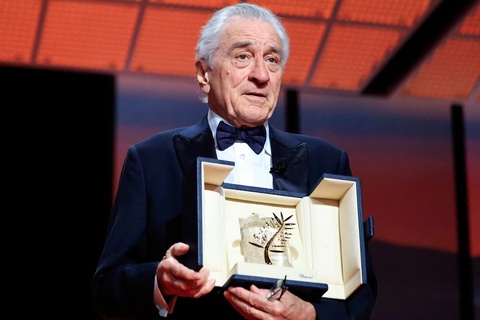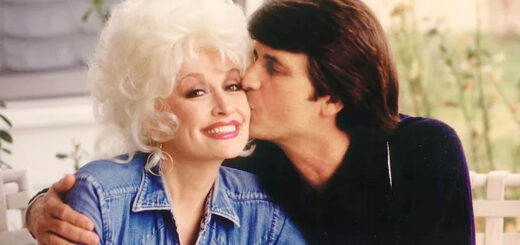“Sit down, Barbie.” — Whoopi Goldberg unleashed a fiery jab at Erika Kirk, branding her a “T.R.U.M.P. puppet” live on air. But just moments later, Robert De Niro stepped in—not to attack, but to defend. With calm resolve, De Niro delivered a powerful truth that left the studio silent, Erika Kirk stunned, and the audience on their feet—applauding not outrage, but a masterclass in respect and integrity.
Television is often a battleground—a place where opinions clash, tempers flare, and drama reigns supreme. But every so often, a moment breaks through the noise and reminds us what really matters: dignity, respect, and the power of standing up for what’s right.
That’s exactly what happened this week when legendary actor Robert De Niro intervened during a heated live broadcast, transforming a tense exchange into an unforgettable lesson in humanity.
The Flashpoint: “Sit Down, Barbie”
The day’s episode was billed as a lively panel discussion exploring the intersection of culture, politics, and celebrity influence. Among the guests was Erika Kirk, a podcast host and conservative commentator known for her unapologetic views. The conversation began civilly, with Kirk offering her perspective on faith, tradition, and public life.
But the atmosphere shifted dramatically when co-host Whoopi Goldberg interrupted Kirk with a sharp retort that instantly echoed across the studio.
“Sit down, Barbie,” Goldberg snapped, her tone cutting through the air. “You’re nothing but a T.R.U.M.P. puppet.”
The reaction was immediate. Gasps rippled across the audience, followed by a mix of uneasy laughter and stunned silence. Cameras zoomed in on Kirk, who appeared momentarily frozen, her expression caught between shock and hurt.
It seemed the broadcast had veered from thoughtful debate to personal attack—and for a moment, it looked as though that would be the lasting memory.

Robert De Niro’s Unexpected Intervention
But then, in a twist no one saw coming, Robert De Niro—an Academy Award winner famed for his tough-guy roles and unfiltered opinions—leaned forward.
His voice was calm, steady, and surprisingly gentle.
“Whoopi,” De Niro began, “you’ve been around long enough to know that tearing someone down doesn’t build anything up.”
The room fell silent. Even Goldberg, rarely at a loss for words, listened intently.
“You can disagree with Erika. You can debate her. You can challenge every idea she puts forward. That’s fair. That’s honest. But when you dismiss her as a puppet, when you call her Barbie—you don’t just insult her. You insult the conversation. You insult the audience that came here to hear something real.”
De Niro’s words weren’t theatrical. They were measured, sincere, and carried the weight of someone who’s seen the highs and lows of public life.
“Respect,” he added, “isn’t agreement. It’s the ground we stand on before we even start talking. Take that away, and all we’ve got left is noise.”
For a few breathless seconds, the studio was utterly silent.
The Audience Responds
What happened next changed the energy in the room completely.
At first, a few audience members clapped quietly. Then more joined in. Within seconds, the entire studio was on its feet, giving De Niro a standing ovation—not for winning an argument, but for restoring a sense of decency and respect to the stage.
Erika Kirk, still visibly shaken, blinked back tears. Though Goldberg’s words had stung, De Niro’s defense seemed to shift the moment from humiliation to validation.

Viral Reverberations
As the credits rolled, clips of the exchange exploded online. Hashtags like #DeNiroSpeaks, #RespectMatters, and #SitDownBarbie trended across social media, with millions watching and sharing the viral moment.
Commenters praised De Niro for defending civility and challenging the culture of insult. One user tweeted, “Robert De Niro reminded us that dignity is not negotiable. In a world addicted to insults, he gave us respect instead.” Another posted, “That was the most powerful thing I’ve seen on live TV in years. A standing ovation for decency.”
Not everyone agreed, of course. Some argued De Niro had undercut Goldberg on her own turf. But nearly all acknowledged the exchange was unforgettable—a rare moment when a celebrity used their voice to elevate the conversation.
The Panel Reflects
Later that evening, Goldberg addressed the controversy on her own platform.
“I’ve always said what’s on my mind,” she wrote. “Sometimes it’s too sharp, and maybe today was one of those times. Robert gave me something to think about. Respect matters—even when it’s tough.”
It wasn’t an apology, but it was a sign Goldberg understood the impact of her words.
For Erika Kirk, the incident was deeply personal. Hours after the show, she posted on Instagram: “I felt humiliated, like I had no voice. But Robert De Niro stood up—not for my politics, but for my humanity. I’ll carry that reminder with me always.”

Media and Cultural Impact
The moment dominated news cycles for days. The New York Times ran an op-ed titled “When De Niro Taught Us Civility,” praising the actor for showing that “disagreement can exist without contempt.” The Washington Post called it a reflection of a larger cultural struggle: “The hunger for dignity in public discourse is real, and moments like this prove it.”
Variety described the exchange as “the unscripted drama that stole the week,” and educators replayed the clip in classrooms as an example of civil disagreement.
De Niro’s Perspective
In a brief interview the next day, De Niro was characteristically modest.
“I didn’t plan it,” he said. “I just couldn’t sit there and let disrespect pass as debate. We’ve got enough division in this world already. Respect is the least we can give each other—no matter who’s sitting across the table.”
His words echoed the very lesson he’d delivered on stage: Civility isn’t weakness—it’s strength.

A Cultural Reset
For many viewers, the moment stood out because it was so rare. In an age when viral clips are built on ridicule and “gotcha” moments, here was a viral sensation built on respect.
As one editorial put it: “It wasn’t about politics. It was about remembering that even in conflict, humanity comes first.”
Conclusion: The Power of Respect
Television thrives on conflict, but sometimes the most dramatic moments are those that transcend spectacle. When Whoopi Goldberg dismissed Erika Kirk with a sharp insult, it seemed destined to be another viral highlight reel of outrage. But Robert De Niro’s intervention transformed the spectacle into a lesson—one that will be replayed, discussed, and remembered for years to come.
For Erika Kirk, it was a moment of humiliation transformed into validation. For Whoopi Goldberg, it was a reminder of the weight words carry. And for Robert De Niro, it was a new kind of role—not as an actor, but as a voice of conscience.
In the end, it wasn’t the insult that endured. It was the standing ovation—for the man who dared to remind us that respect, above all, is what keeps conversation human.


